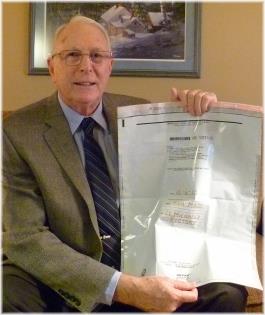|
A Message from the Author |

|
January 1, 2018 Greetings: If there were ever a contest to determine the best example of Benjamin Franklin’s observation, An ounce of prevention is worth a pound of cure, a church's Sunday collection would surely be a top contender. As a retired federal law enforcement official with significant experience in the detection and investigation of financial irregularities, I have witnessed a number of cases in which otherwise good, God-fearing men and women succumbed to the temptation presented by easy access to public funds or property. And in virtually every case, the targeted funds were less vulnerable than is the average church's Sunday collection. A Sunday collection embezzler might begin by telling him/herself they're only borrowing the funds to cover some legitimate personal or family need. As time goes by, however, and they realize how easy it is to borrow (in this case, from the Sunday collection), they can begin to rationalize about how hard they work for little or (in the case of church volunteers) no pay, and how their church really owes it to them. As one can imagine, it's all downhill from there. Judas was Christianity's first embezzler (JOHN 12:6) but today, some 2000 years later, an unknown but significant number of church embezzlements are ongoing at any given time. No one knows how many, because most church leaders, being unschooled in Security and having a deep-rooted aversion to its connotation of mistrust, have never recognized or accepted the absolute need for effective internal security to both deter and detect surreptitious theft. Reliance upon what are essentially 19th Century methods to protect the Church’s primary source of income in the 21st Century is simply unacceptable. It might sound melodramatic, but the long-term fiscal wellbeing of your church, parish or diocese could well rest in your hands. In 2005, the Archdiocese of Chicago (then under the leadership of Cardinal George) implemented a codified version of our Sunday collection guidelines Archdiocese-wide. While I don’t know whether they remain in effect today—see the next paragraph for more on that—I do know they led to the identification of at least one embezzler (a pastor) who was plundering his parish’s Sunday collections to support a lavish and, as is often the case, perverted lifestyle. To learn more about that sad case, click here. At this writing, an unknown number of dioceses and archdioceses appear to have gravitated to genuinely secure procedures that, for the record, must begin with each collection being promptly secured within a serially-numbered, self-sealing, tamper-evident container (pictured above) or a drawstring or zippered bag secured with a numbered tamperproof seal, examples of which are illustrated on the “Introduction” page of this website. And while I’m hopeful other archdioceses and dioceses will follow suit, only a Conference-wide mandate issued by the U. S. Conference of Catholic Bishops (USCCB) can ensure the permanence of genuinely secure procedures; as matters stand, any new bishop can undo the good work of his predecessor with the stroke of a pen. It is therefore my sincere and continuing hope that my 2011 book, NONFEASANCE, along with the righteous demands of concerned Catholics throughout the U.S., will provide the motivation the USCCB presently appears to lack. If you’d like to know more about my book, I invite you to watch this video and/or visit this webpage. Sincerely, M W Ryan Michael W. Ryan
|